Interviews
Catching Up With Washington Post Reporter David Nakamura
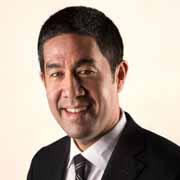
David Nakamura, 53, started at The Washington Post as a summer sports intern in 1992 and has been with the paper for more than 30 years. After four years as a sports reporter, he moved to local news to write about education and city government. In 2004, he was part of a team that uncovered high levels of lead contamination in D.C. tap water, a series that won a Selden Ring Award for investigative reporting. Nakamura has reported from Afghanistan, Pakistan and Japan, and from 2012 to 2020, he covered the Obama and Trump White Houses. He was interviewed via email.
JournalismJobs.com: You covered the Obama and Trump White House from 2012 to 2020. What was that like?
David Nakamura: Covering the White House was, depending on the moment, a thrill unlike any other and a grind. Some aspects of the job changed dramatically between administrations. With a close view of the pinnacle of political power in the world, you are privy to some of the world’s biggest news events as they happen and you can witness how decisions made by the president can affect global events, and even the lives of ordinary people. At the same time, they don’t call it a “bubble” for nothing. The security and limited access to the main decision maker — the president, himself, in this case — can be extraordinarily frustrating and there are times when logistical considerations – being inside secure access points or waiting for a presidential movement — constrains the ability of White House reporters from doing more shoe-leather reporting or getting a broader view of what is happening.
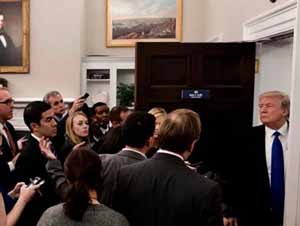
The best reporters talk to sources inside the White House but also among the foreign diplomats and on Capitol Hill and outside the Beltway, as well as ordinary Americans. The job of covering the White House shifted between the Obama administration, which was fairly leak-proof and far more message disciplined, and the Trump administration, which was leakier and more chaotic. A good portion of our job was aimed at political analysis in explaining to readers how the president made decisions and the gap between their campaign promises and rhetoric and the actual policies they were pursuing in office. During the Obama era, a key line of coverage was identifying small shifts in rhetoric and policy aims and highlighting for readers why the president had changed course; during the Trump presidency, the goals were the opposite: things shifted so quickly that part of the job was to try to find a consistent throughline in what was happening amid all the turbulence.
JournalismJobs.com: While flying on Air Force One, did Obama or Trump ever come back to talk to the pool reporters?
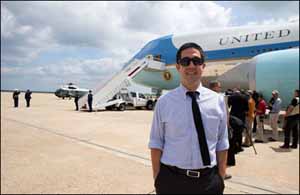
David Nakamura: Yes, both presidents came back to the rear of the plane, where there are 13 seats reserved for the traveling “press pool” (including tv, radio, print/web and photographers). Obama almost always spoke off the record; Trump would sometimes do on-record sessions on the plane. Their press secretaries also would hold an on-record briefing for reporters in the press cabin – standing while reporters crowded around; there are not that many rules on AF1, in terms of remaining in your seat or using your seat belt, as there are on commercial aircraft.
On rare occasions, the news media would be permitted to go to a space toward the front of the plane, such as a conference room where sometimes the president would sign an action or be holding a staff meeting; I only did that once: I was on Trump’s first-ever AF1 flight and reporters were pushing to get a photo of him. We lined up and were told we could go to his private office, but then we were sent back because of turbulence. This happened a second time and then the plane landed and we were finally allowed to go to his office while we were on the tarmac. Trump was watching CNN and had a new AF bomber jacket with his name on it on the back of his chair. I remember he didn’t bother to turn the sound down on the TV while we were in there — mostly it was a photo opp. I did ask him a question, but he only said a few words in response and mostly appeared focused on looking serious for the cameras.
JournalismJobs.com: What is one of your most memorable moments covering the White House?
David Nakamura: I have a ton of memorable moments, for different reasons. Some of the ones I often talk about came on foreign trips – I was the first reporter to ask a question of and get an answer from North Korean dictator Kim Jong Un – during his 2019 summit with President Trump in Hanoi. I was on Aung San Suu Kyi’s front lawn when President Obama arrived in his motorcade in 2012, along with Hillary Clinton, and Hillary embraced her in the driveway.
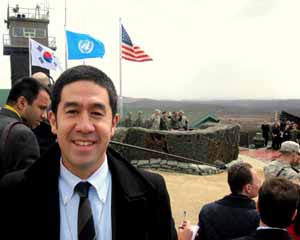
I flew to the Korean DMZ with both Obama and Biden. But perhaps the most memorable was being in the press pool for Obama’s visit in 2013 to Robbin Island to visit the jail cell where Nelson Mandela spent more than a decade doing hard labor in South Africa. The island was closed for the American delegation, which included Michelle Obama, Malia and Sasha. We landed in the White House helicopters and traveled in the motorcade past Secret Service snipers in the brush; the Obamas also toured a limestone quarry where a former prisoner who was friends with Mandela talked to them about the experience.
JournalismJobs.com: Why did you decide to leave the White House beat?
David Nakamura: I covered the White House for nine years. The last, in 2020, was the most challenging –due to the tremendous upheaval that affected the country and the world: a pandemic, the racial justice protests and the presidential election, and Trump’s efforts to overturn the results. Personally, I also had a major shift at home in terms of helping my young children with virtual school; my mother-in-law, who had lived with us for a number of years, also left that year. Which is to say, after devoting so much time to covering the White House, I knew that realistically I needed a different pace to prioritize family.
JournalismJobs.com: Growing up, you dreamed about being a sports reporter. After two summer internships, you got a job at The Washington Post in 1993 covering college sports. But then in 1997, you switched to covering local news. Do you have any regrets about leaving sports journalism?
David Nakamura: When I left sports, I applied for a job in local news and was granted one—in the Post’s most remote bureau in Loudoun County, Va., an hour drive from where I lived in D.C. I covered education and recall covering a sports pep rally at a high school – just months after I had covered the Rose Bowl in Anaheim. People sometimes say they want to pinch themselves to make sure they aren’t dreaming – I used to joke I felt like pinching myself to hope I woke up and was still covering sports. A lot of people thought I was crazy to leave sports because it seems like more fun. Sometimes I miss it a lot. Ultimately, though, my career enabled me to cover a lot of different things – the Washington mayor; the Nationals’ baseball stadium financial funding fight; the war in Afghanistan; the aftermath of the 3/11 Tohoku earthquake in Japan. In that regard, I consider myself very fortunate.
JournalismJobs.com: The duties of a journalist have changed a lot since you started more than 30 years ago. What are the challenges you face today?
David Nakamura: Yes, the duties have changed a lot. As a 25-year-old sports reporter, I used to sit next to Shirley Povich, the legendary sports writer who was then still coming into the office at 90 years old. He used to talk about covering Babe Ruth and filing stories via teletype. The changes in my days have been as dramatic. In my earliest days, we hooked up our Tandy 100 or Tandy 200 word processors to telephone couplers and filed by calling an 800 number and praying that it connected – and throwing a fit if it did not. Now I’ve filed blog items or even short stories on my iPhone while in the presidential motorcade or around the world. The pace has gotten faster, the job can be around the clock, we are pressed to write headlines with SEO and we are attacked, mocked and even threatened on social media. But the fundamentals of the job are the same – getting at the truth, finding and telling good stories in a fair, thorough way and trying to get information and facts to the public.
JournalismJobs.com: The field of journalism has taken quite a hit politically over the past 10 years. In trying to report the facts, how do you navigate such a divided political landscape in your reporting?
David Nakamura: This is difficult because politicians -- especially in the age of social media and a diversified media landscape where people can so easily reinforce preexisting biases — seek to make reporters appear partisan and discredit what we do as untrustworthy. Journalists and news organizations have certainly made mistakes, some big ones, that have not helped maintain or restore public trust.
However, at the Post we have tried to “show our work” by linking online to original source materials and documents, explaining a bit more about our reporting process (often our biggest stories make a point of telling readers how many interviews we’ve done or how many documents we’ve read). We’ve tried to be sharper in our language at a time when media critics have been right to question false equivalency and we are also trying to correct our mistakes when we do mess up in a clearer and more forthright manner. It’s not always easy to admit we got something wrong but doing so can distinguish us from partisan sources that do not adhere to the facts or respect the truth.
JournalismJobs.com: Because social media makes it easy to post messages, do you receive much criticism from your reporting?
David Nakamura: I get legitimate criticism about stories but also plenty of attacks that are not in good faith. I think people know well that sources like Twitter are rife with trolls, bots and bad-faith partisan operators just lying in wait for reporters to expose themselves to cheap attacks and viral dunking. Reporters ourselves also partake in this but certainly the brutal partisanship strays often into concerns over our safety. At the same time, I have had thoughtful responses to my work, some of which have resulted in corrections or clarifications – or at least offered me a broader frame for my thinking about my coverage. I’ve also gained sources and called people who have thoughtful things to say.
JournalismJobs.com: Has social media made your job harder?
David Nakamura: Beyond fending off personal attacks, social media can complicate our jobs in other ways. For example, when journalists spend time on a site like Twitter, petty controversies or relatively unimportant issues that go viral can appear like they are worthy of news coverage or a lot of attention -- when, in fact, most Americans don’t know about it or don’t care. There’s a reinforcing bubble there that is concerning for reporters and editors who have to assess what we want to spend our time on.
JournalismJobs.com: You've made a lot of appearances on "Face The Nation," MSNBC and other news outlets. Have you ever considered switching to broadcast journalism?
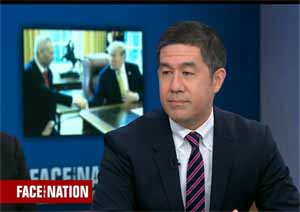
David Nakamura: I have an older cousin who spent his career in television journalism. When I was in high school, I visited the set at his station and thought it was cool. But I never seriously considered making the switch. While covering the White House, I did hundreds of “hits” – but I came away not loving it. I was asked about things I didn’t cover directly or to offer opinions when I was restricted in doing so as a straight-news reporter. I also was asked to participate in some fairly oddball segments on cable stations that were experimenting with how to keep the attention from viewers, and I came away mostly feeling icky about it – not about journalism ethics but rather than the performance aspect of television news at times overtook the journalism aspect.
JournalismJobs.com: Which story are you most proud of over the years?
David Nakamura: I have a lot of stories that I still remember and hold dear for different reasons, ranging from personal essays to scoops to narrative stories to analysis. But perhaps the most impactful series that I worked on – with the most tangible effect on readers – came in 2004 when I broke news that the D.C. Water and Sewer Authority had discovered lead contamination in the drinking water of thousands of D.C. homes and had failed to disclose this to the public. This story became a huge scandal with wide-ranging public accountability that came from our reporting – including the city’s decision to replace lead pipes, provide blood tests and water filters to all families and new regulations in the city and across the country. Parents came up to me and hugged me when I arrived at public hearings about the fallout. I didn’t have kids at the time but now that I do, I realize how important local news reporting can be. A series of our stories was awarded the Selden Ring Award for investigative journalism. A colleague on our team wrote a piece about how it all came together here.
JournalismJobs.com: What sort of advice would you give to college students thinking about going into print journalism?
David Nakamura: What I would say first is that even the term “print journalism” is a relic – most news organizations are sort of melding into similar multimedia products. CNN has the most popular news site in the country; The Washington Post has a YouTube channel and we broadcast live during big events and do podcasts and video packages, as well as produce extraordinary multimedia packages on climate change and other topics. For more than two decades now, journalism has been contracting, with fewer outlets and far fewer jobs. It can be a difficult industry and a lot of legacy media and new media endeavors have gone out of business. Reporters have been laid off in droves.
That said, the job can still be among the most fun and exciting there is, filled with adventure and a sense of mission. Young people coming up are fluent in online culture, so I don’t need to offer wisdom like “be tech savvy” or “learn to code.” I think perhaps the best advice I might give is to do the opposite of what I’ve done in my career – I’ve been a generalist and shifted around to many different topics. Now, I often see reporters become immersed in a specific area and try to become an expert – or even a “brand.” That can be a bit foolish, especially when you think of yourself as more important than, say, your news organization or the public officials you cover. But readers/viewers, with the whole internet at their fingertips, are desperate for factual, informed coverage from people who can really cut through the noise and explain what is important at a time when the world is rife with misinformation and disinformation.
Other Interviews:
Four-Time-Pulitzer-Winner David Barstow



